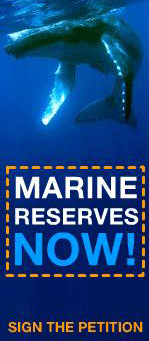News
Result! Swedish food chains stop selling unsustainable seafood
22 May 2008

Almost all food chains have decided to stop selling seafood from unsustainable sources. This major market development is revealed in Greenpeace’s new league table ranking of the Swedish food chains. Since our last ranking in March there have been many changes - BergendahlsGruppen and Axfood now share first place, closely followed by ICA. Next come Vi and Lidl.
“Great improvements like this in this short time are a unique and very positive success,” says Staffan Danielsson, spokesperson on Ocean issues, Greenpeace.
The decision from several food chains to stop selling unsustainable seafood implies essential environmental improvements in the ocean and is sending a very strong signal to decision-makers that degraded fish stocks must be allowed to recover, and the method of fishing must be changed so that gear does not destroy the marine environment. Consumers will no longer, for example, risk buying the last of the eels; now the politicians and fishing industry must play their part and take their responsibilities seriously.
BergendahlsGruppen, which owns companies such as City Gross, has decided to stop selling unsustainable produced seafood products and to demand more responsible action from their suppliers. They require, for example, that the suppliers stop sourcing all tropical shrimps, production of which is very environmental damaging for the mangrove forests. The group have also started a new cooperation with tuna fish dealers, so that consumers can get almost full traceability by checking the package labelling.
“Seafood is important for us and we want to take an active responsibility so that the products we sell are sustainable now and in the future,” Annica Hansson Borg, Quality manager at BergendahlsGruppen says. “Many customers have contacted us and asked us what we are doing - now we have a concrete action plan.”
Axfood, which owns Hemköp and Willys, has also improved its policy substantially, and among other things has sharpened its traceability policy and the demands on their suppliers. “Of course we want to help our customers so that they do not risk buying fish from threatened stocks,” says Åsa Domeij, Environmental manager at Axfood.
ICA has toughened its policy with stricter demands on the suppliers, and has started comprehensive cooperation so that it is able to provide sustainably caught fish and improved traceability. The Vi Group has also adopted a sharpened policy with new demands on its suppliers, and Lidl has toughened its requirements in order to guarantee traceability. Co-op has declared that they will only sell products from long-term sustainable fisheries, but is not taking any policy decisions until the autumn. Netto has stopped selling cod and plaice, and has a goal that in five years they will only be selling MSC-labelled fish. Today Netto’s share is 37.5% of their sales.
If customers still find unsustainable seafood in the stores it can be due to two things: firstly, the shops must sell out their stock since it is even more irresponsible to waste the seafood. However, from central storage depots, products are being returned to suppliers. It can also be due to independent dealers, e.g. some ICA traders with control over their own seafood ranges. This can be a problem in relation to tropical prawns in some stores. Customers who find endangered fish in their local shops are encouraged to demand that their local trader follows the central environmental policy of the chain.
Greenpeace is happy about the improvements in the food supply chains and is continuing to ensure that the environmental improvements will continue. The suppliers must be able to deliver sustainable products. Leading suppliers of fish must put stricter demands on fishermen, fishery managers and politicians so that management of the ocean resources is improved substantially, that the control of fisheries is strengthened and that fishing gear is adapted so not to harm the ocean environment. Sustainable fisheries is a demand from shops and consumers - now the authorities must take their responsibility.





